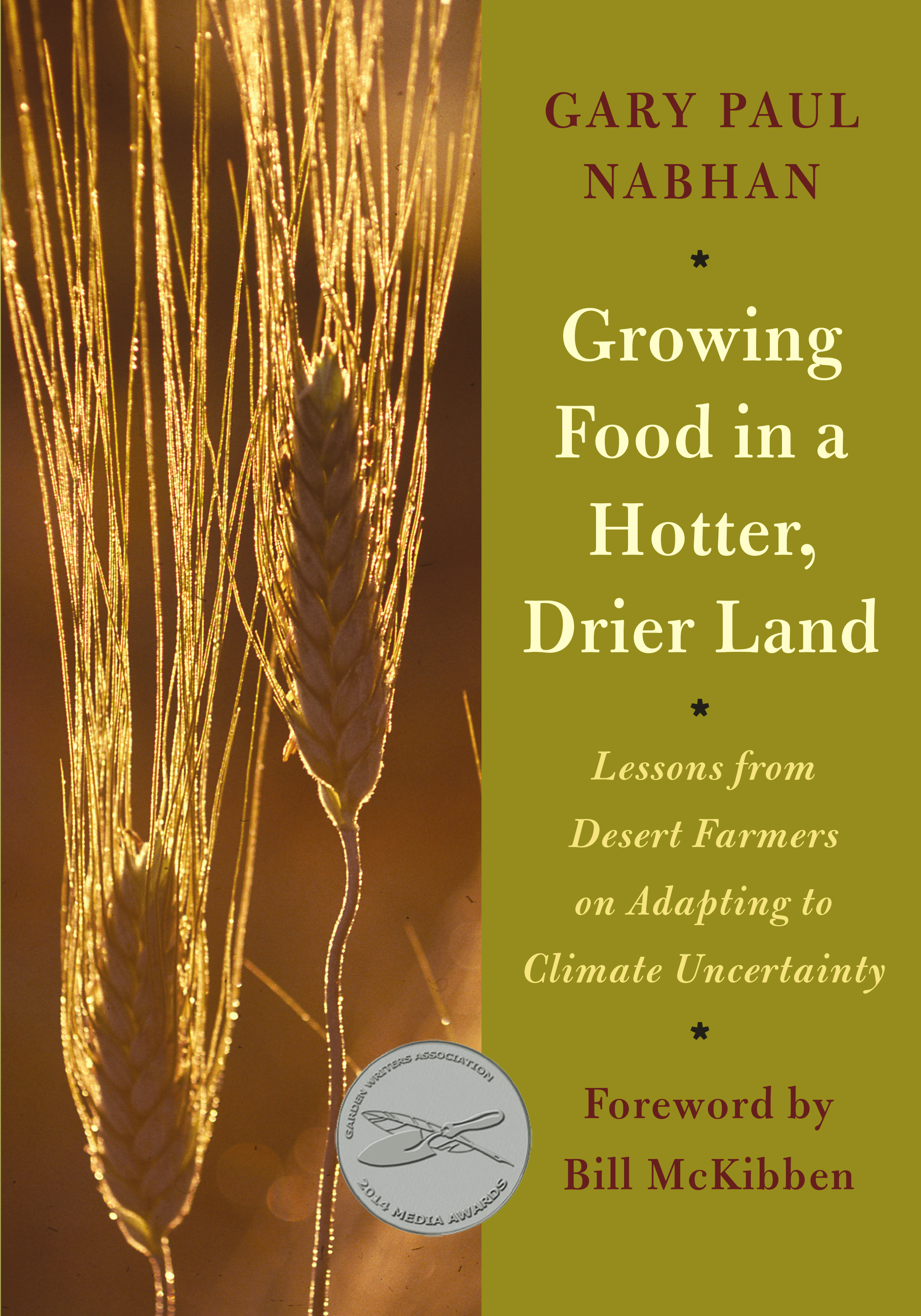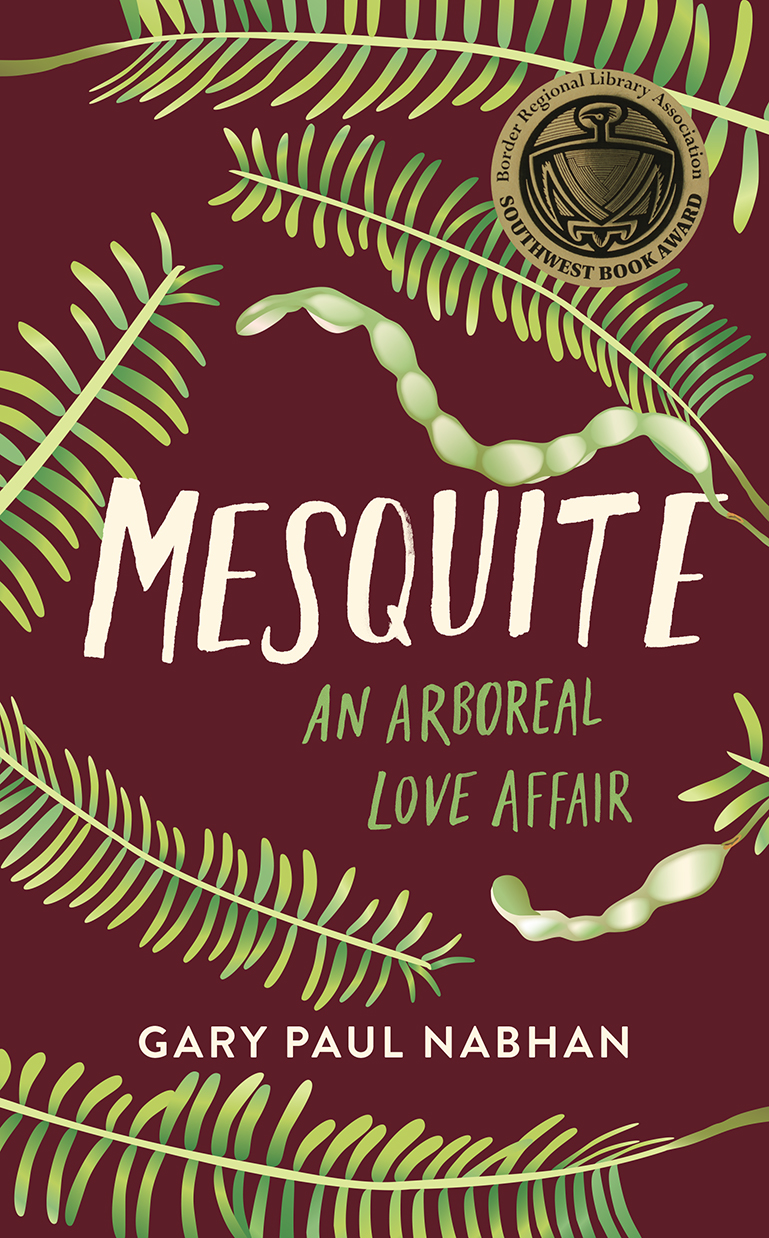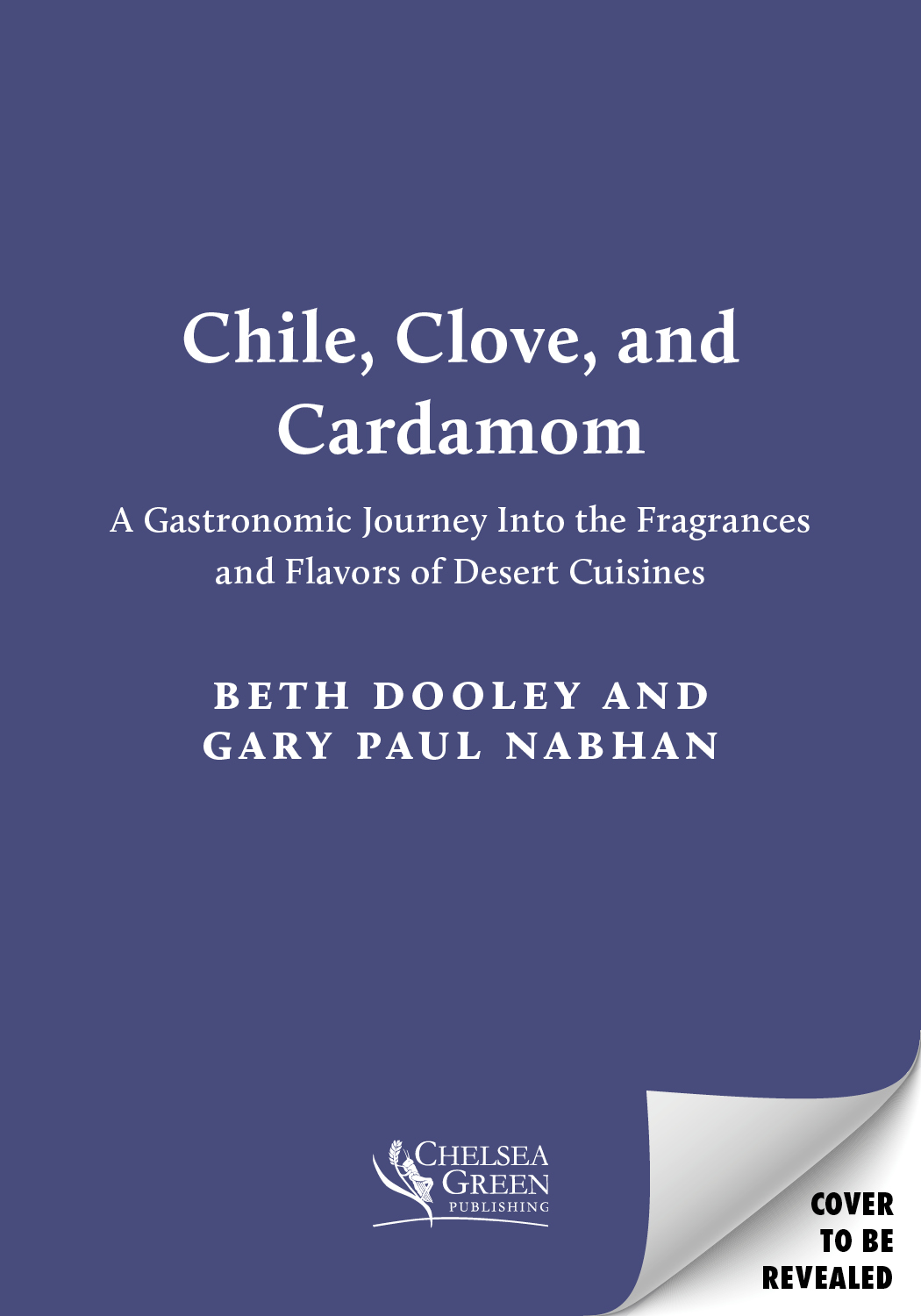Mesquite
An Arboreal Love Affair
Winner of a 2019 Southwest Book Award (BRLA)
An homage to the useful and idiosyncratic mesquite tree
In his latest book, Mesquite, Gary Paul Nabhan employs humor and contemplative reflection to convince readers that they have never really glimpsed the essence of what he calls “arboreality.”
As a Franciscan brother and ethnobotanist who has often mixed mirth with earth, laughter with landscape, food with frolic, Nabhan now takes on a large, many-branched question: What does it means to be a tree, or, accordingly, to be in a deep and intimate relationship with one?
To answer this question, Nabhan does not disappear into a forest but exposes himself to some of the most austere hyper-arid terrain on the planet—the Sonoran and Chihuahuan deserts along the US/Mexico border—where even the most ancient perennial plants are not tall and thin, but stunted and squat.
There, in desert regions that cover more than a third of our continent, mesquite trees have become the staff of life, not just for indigenous cultures, but for myriad creatures, many of which respond to these “nurse plants” in wildly intelligent and symbiotic ways.
In this landscape, where Nabhan claims that nearly every surviving being either sticks, stinks, stings, or sings, he finds more lives thriving than you could ever shake a stick at. As he weaves his arid yarns, we suddenly realize that our normal view of the world has been turned on its head: where we once saw scarcity, there is abundance; where we once perceived severity, there is whimsy. Desert cultures that we once assumed lived in “food deserts” are secretly savoring a most delicious world.
Drawing on his half-century of immersion in desert ethnobotany, ecology, linguistics, agroforestry, and eco-gastronomy, Nabhan opens up for us a hidden world that we had never glimpsed before. Along the way, he explores the sensuous reality surrounding this most useful and generous tree.
Mesquite is a book that will delight mystics and foresters, naturalists and foodies. It combines cutting-edge science with a generous sprinkling of humor and folk wisdom, even including traditional recipes for cooking with mesquite.
Reviews and Praise
Choice Reviews—
"Nabhan teaches ecological lessons to nonscientists through an impressive range of disciplines: ancient history, ethnobiology, paleo-nutrition, ecology, history, anthropology, and more. In each of 16 chapters, he examines one facet of this fascinating shrub: how it grows and spreads, how its wood is used for fence posts and for exquisite woodcrafting, and, centrally, how its pods have been used for centuries as food (recipes included). . . . In a conceit that begins and ends each chapter, [Nabhan] confesses his secret: he has come to think of the mesquite as a lover, and he is gradually transforming into one himself."
More Reviews and Praise
Kirkus Reviews—
"An unconventional ode to the wonders of mesquite. Call it a love affair or an obsession: Award-winning nature writer and ethnobiologist Nabhan (Ethnobiology for the Future: Linking Cultural and Ecological Diversity, 2016, etc.) has a thing for mesquite. Early on he writes rapturously of his desire to become a tree, or at least to become more like a tree—and not just any tree. In his view, the mesquite is of singular importance as an icon, a framer of one's worldview, a foodstuff, a beverage, a seasoning, a medicine, an antiseptic, a source of fiber and fuel, and a resource for architects and artisans. The author also argues that mesquite has feelings and intelligence, defending this thesis with down-to-earth stories about its remarkable abilities to heal itself, to engage with and offer nourishment and pleasure to its flora and fauna neighbors, and to shape its environment. Nabhan has clearly spent considerable time as an observer of mesquite, and he has a way with words, sometimes punning, sometimes waxing poetic, and never, it seems, holding back in his enthusiasm for his subject. He invites readers to pledge allegiance with him 'to this flagship species of the United Desert States of America, and to the mycorrhizal mass on which it stands, one cohesive nation in all creation, its flora and fauna indivisible, with love fests and wild times for all.' Mixed into this odd, sometimes preachy, and often emotional mélange is plenty of solid information about mesquite, its history, and its utility. An activist in the local food movement, Nabhan concludes with 11 mesquite recipes, some quite labor intensive, and detailed instructions for harvesting and processing the pods. A charming yet quirky book that may puzzle readers outside the deserts of the American Southwest, who are accustomed only to supermarket bags of mesquite for their charcoal smokers.
“By turns informative, playful, funny, and wise, Mesquite is a fascinating, tour de force illumination of the natural, cultural, and spiritual value of a truly remarkable desert tree. Gary Nabhan’s gift to readers is the imaginative and redemptive suggestion that we still have plenty to learn from the more-than-human world that flourishes even under the harshest conditions. A gem from one of our finest western American writers, Mesquite is a spectacular accomplishment and a wonderfully entertaining read.”—Michael P. Branch, author of Rants from the Hill and How to Cuss in Western
“With a reverently irreverent blend of natural history, magical realism, social commentary, and humor, Nabhan invites us to fall in love with one of America’s most misunderstood and maligned plants. Masterfully performing the great sleight of hand trick of classic nature writing, Nabhan employs close observation of the outside world to go deeper within.”—Liz Carlisle, author of Lentil Underground
“In this rapturous, provocative, and intimate book, Gary Paul Nabhan takes readers on his quest for symbiosis with mesquite! It’s a paean to the venerable desert legume, a humorous meditation on human knowledge, and a somewhat Kafkaesque journey into the deep state of vegetal oneness with a tree. It is full of wry observations, heartfelt hopefulness, and vivid stories—with a big dash of trippy fun!”—Courtney White, author of Grass, Soil, Hope and Two-Percent Solutions
“It seems that Gary Paul Nabhan has been experiencing a case of mesquiten identity! In this book we learn how he came to belong to the genus Prosopis. Along the way we also learn about mesquite biology, evolution, ecology, culture, cuisine, and conservation. Like the mesquite, Gary is deep-rooted in our arid landscapes and communities. He crosses borders. He bears blossoms of wit and pods of knowledge. As he finds himself transformed, so does the reader. We become a bit more mesquite-like ourselves—and, somehow, that much more human.”—Curt Meine, conservation biologist; senior fellow, The Aldo Leopold Foundation
“Delicious! This book nourishes the soul, home, and palate with stories and characters as alluring and complex as the trees they love and celebrate.”–Brad Lancaster, cofounder of Desert Harvesters; author of Rainwater Harvesting for Drylands and Beyond
About The Author
| Pages: | 224 pages |
| Size: | 5.5 x 8.5 inch |
| Publisher: | Chelsea Green Publishing |
| US Pub. Date: | June 19, 2020 |
| UK Pub. Date: | May 28, 2020 |
| Paperback: | 9781603589857 |
Available In/Retail Price
Paperback, 224 pages, $18USD, £14.99GBPMEDIA & EVENT INQUIRIES
Media Inquiries:
Contact Publicity at: [email protected] or (802) 295-6300 x 127
Event Inquiries:
To set up an author appearance or event contact Darrell Koerner at [email protected]
Review Copies:
Click here to request a review copy of one of our books.
Rights & Permissions
Email us for rights & permissions inquiries.
SALES CONTACTS
Special, Corporate and Academic Sales
Darrell Koerner
[email protected]
(303) 963-5612
Trade and Library Sales
Kirsten Drew
Book Strategy Manager
[email protected]
Independent Bookstore Sales
To place a retail wholesale order, please contact the appropriate regional representative.
Canadian and Overseas Trade Distribution
To place an international wholesale order, please contact the appropriate foreign trade distributor.
Academic Kit
Request a desk or evaluation copy.




